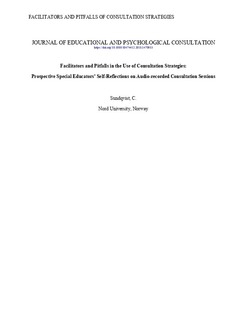The three-tiered support system and the special education teachers role in Swedish-speaking schools in Finland
Journal article, Peer reviewed
Accepted version
Permanent lenke
http://hdl.handle.net/11250/2602205Utgivelsesdato
2019Metadata
Vis full innførselSamlinger
Originalversjon
Sundqvist, C., Björk-Åman, C. & Ström, K. (2019). The three-tiered support system and the special education teachers role in Swedish-speaking schools in Finland. European Journal of Special Needs Education. doi: 10.1080/08856257.2019.1572094Sammendrag
In 2010, new amendments regarding special education were made to the Finnish Basic Education Act (642/2010), and they were officially adopted in 2011. The three-tiered support systemthat was introduced can be considered the Finnish approach to moving education toward a more inclusive system since it emphasises all teachers’ responsibility to deliver support within the regular educational setting, representing a new feature in the policy documents. This has brought about new expectations for special education teachers’ (SETs’) roles. Our research aims to contribute to knowledge about the implementation of the three-tiered support system and SETs’ roles in Swedish-speaking schools in Finland. The data were collected using a questionnaire (N = 158). The results indicate that the SETs have an important role in the three-tiered support system, both as those with the knowledge and thosewho share this knowledge. The SETs’ role is more evidentwhen it comes to pupils receiving support on the second and third tiers. Although inclusive values are emphasised in the policy documents, the SETs still use most of their time teaching pupils in educational settings that are often relatively segregated (individual or small-group teaching), and for example, co-teaching seems to be a less frequent approach to collaboration.
